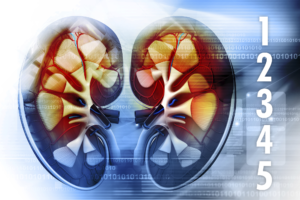What is Chronic Kidney Disease (CKD)?
Chronic kidney disease (CKD) refers to the gradual loss of kidney function over time. When kidneys are healthy, they filter out wastes and excess fluids from the blood, which are then excreted through urine. However, in CKD, the kidneys' ability to perform these tasks deteriorates slowly. This condition can eventually lead to accumulated levels of fluid, electrolytes, and wastes in the body. The term "chronic" is used because the damage to the kidneys develops gradually and can go unnoticed for a long time.
Main Causes of CKD
CKD is primarily caused by conditions that inflict damage on the kidneys' blood vessels, leading to reduced kidney function. The most common causes are type 1 and type 2 diabetes and high blood pressure, but it can also result from conditions like glomerulonephritis, interstitial nephritis, polycystic kidney disease, and prolonged urinary tract obstructions. Metabolic disorders, especially those linked with obesity and insulin resistance, are also significant contributors to the progression of CKD due to their impact on blood sugar and blood pressure levels.
- Primary causes include diabetes (type 1 and 2) and high blood pressure.
- Other contributors: glomerulonephritis, interstitial nephritis, and polycystic kidney disease.
- Metabolic health issues like obesity and insulin resistance also play a role.
Identifying CKD
The detection of CKD typically involves blood and urine tests. The estimated glomerular filtration rate (eGFR) is a blood test used to assess how well the kidneys are filtering wastes from the blood, while the urine albumin-to-creatinine ratio (uACR) measures protein levels in urine. A combination of these tests helps determine the presence and stage of CKD. An eGFR under 60 and/or a uACR over 30 for three months or more could indicate kidney disease.
- Diagnosed through blood and urine tests: estimated glomerular filtration rate (eGFR) and urine albumin-to-creatinine ratio (uACR).
- An eGFR under 60 and/or a uACR over 30 for three months indicate kidney disease.
Stage 5 CKD Explained
Stage 5 CKD, also known as end-stage kidney disease (ESKD) or kidney failure, occurs when the eGFR drops below 15. At this stage, kidneys have lost nearly all their ability to do their job effectively, leading to the necessity for dialysis or a kidney transplant to sustain life.
- Also known as end-stage kidney disease (ESKD) or kidney failure.
- Occurs when eGFR drops below 15; signifies severe loss of kidney function.
- Requires dialysis or kidney transplant for survival.
Treatment Approaches
Treatment for stage 5 CKD aims at managing symptoms, slowing the progression of the disease, and maintaining quality of life.
This may include dialysis to replace kidney function or a kidney transplant.
Alongside these treatments, managing underlying conditions like diabetes and hypertension is crucial. Lifestyle adjustments, such as quitting smoking, reducing alcohol intake, maintaining a healthy weight, exercising regularly, and adopting a kidney-friendly diet, play an essential role in managing CKD. These changes can help slow disease progression and improve overall health.
- Focuses on managing symptoms and slowing disease progression.
- May include dialysis, kidney transplant, and managing diabetes/hypertension.
Lifestyle and Dietary Changes
Metabolic health significantly impacts CKD, as conditions like diabetes and metabolic syndrome can exacerbate kidney damage. Controlling blood sugar and blood pressure is paramount in slowing CKD's progression. A kidney-friendly diet typically involves limiting sodium, potassium, phosphorus, and protein intake to reduce kidney strain and prevent waste accumulation in the blood.
- Key lifestyle changes: Quit smoking, remove alcohol, lower sugar and carbohydrate consumption, maintain healthy weight, exercise.
- Kidney-friendly diet: Limit sodium, potassium, phosphorus, and protein.
Ketogenic Metabolic Therapy
Ketogenic metabolic therapy, which involves a low-carbohydrate, high-fat diet, has been explored as a potential intervention for CKD, particularly in patients with obesity or diabetes. This approach aims to improve metabolic health, but its effects on CKD need to be considered with caution and under medical supervision, as dietary needs can vary significantly among individuals with kidney disease.
- Explores low-carbohydrate, high-fat diets, especially for those with obesity or diabetes.
- Should be approached with caution and under medical supervision.
- Remember: Early detection and management of conditions like diabetes and hypertension are vital in combating the progression of CKD.
- Always consult healthcare professionals for personalized advice and treatment plans.
In summary, CKD is a severe condition, particularly in its advanced stages, requiring careful management through medical treatment, lifestyle changes, and dietary modifications. Early detection and management of underlying conditions like diabetes and hypertension are critical in delaying the progression of the disease.
To find an experienced renal dietitian: https://santabarbaranutrients.com/pages/find-a-practitioner
Learn more about diet and lifestyle changes for Kidney Disease here: https://santabarbaranutrients.com/pages/find-a-practitioner
For expert advice on nutrition for Kidney Disease visit the Kidney Nutrition Institute: https://kidneynutritioninstitute.org/

Einen Kommentar hinterlassen: